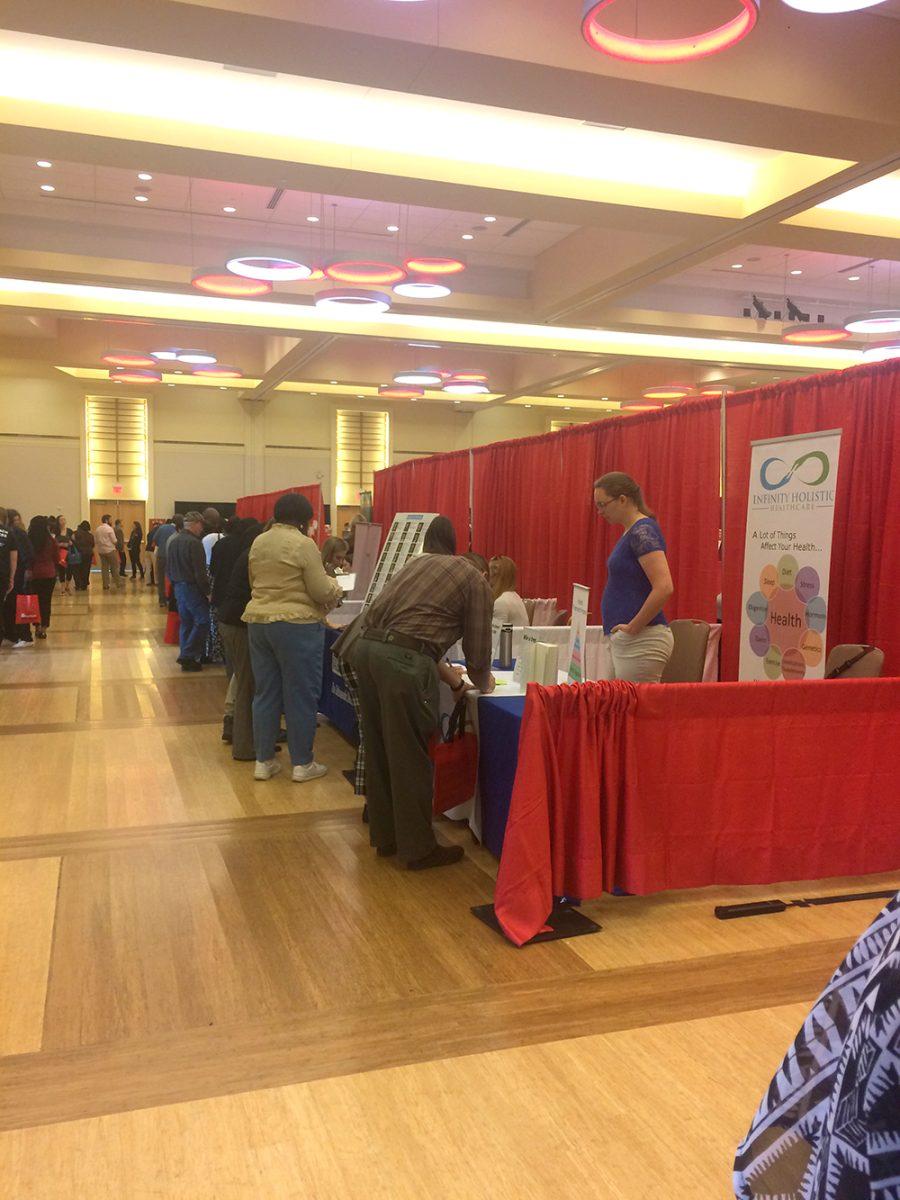Achieving overall wellness is not at the top of every college student’s to-do list, but the benefits of living an overall healthy lifestyle, in every aspect, is something that will relieve stress and help improve overall success in a wide variety of areas. The first-ever Wellness Fair, “The Wolfpack Way of Life” boasted more than 70 vendors from Naked Juice to Student Legal Services to Susan G. Komen for the Cure. The fair took place Thursday from 11 a.m. to 2 p.m. in Talley Student Union’s State Ballroom.
The premier event encompassed the six aspects of wellness: career, social, financial, emotional, physical and community. Each of these aspects was equally represented at the fair, as students and faculty alike could visit multiple booths and find out more information on each wellness element.
Students and faculty lined up to sample healthy foods such as Lebanese couscous Soul Sprout Accelerated Energy bars and veggie chips. After eating a healthy snack, one could visit booths according to what element of wellness one is concerned with. Shannon DuPree, university wellness specialist, was responsible for organizing the event and was pleased with its generous turnout.
“Traditionally you think about wellness as physical activity and nutrition, but we brought together counselors to bring in that mental piece, but it’s also about career because we’re at a university, and it’s also about financial wellness and academic compartments,” DuPree said. “With that idea, we thought it was a good idea to have a wellness fair to showcase all the resources we have on campus.”
Shannon collaborated a Wellness Fair planning committee that had representatives from Student Involvement, Sustainability, Human Resources, NC State Dining and a few University Recreation employees. The committee began planning the fair during the fall semester and reached out to more than 80 vendors.
Dupree said she especially values wellness, as she did not always have access to key wellness-boosting resources while growing up in eastern North Carolina.
“There aren’t really a lot of resources there, and in the community if you look at the demographics, eastern North Carolina is really high in diabetes, heart disease, teen pregnancy and all these negative health outcomes,” DuPree said. “I wanted to see how I could make a difference. Health education was that avenue for me, since health promotion is something I’ve always been passionate about.”
DuPree notes that one of her goals as a wellness specialist is to help students grow and develop into their best selves, as well as to inform students of on-campus and community resources that can help in the process.
“You can’t be the best engineer or doctor that you strive to be if your own wellness isn’t what it needs to be,” DuPree said. “If you’re not emotionally well or not physically well, these things impact you in how you perform in class. We want students to value wellness, and see it in a different light.”
Resources such as University Recreation, NC State Dining, the Career Development Center, the Counseling Center and the wellness department offer ways for students to increase overall health. The wellness department offers students a chance to improve time management, fitness, stress management and more by pairing them with a certified wellness coach. The app “My Fitness Pal” is a source NC State Dining offers to help students track their nutritional intake.
The North Carolina Rape Prevention and Education Program, a program aimed at preventing sexual assault and providing resources to victims, shared key information to Wellness Fair attendees. Glorina Stallworth, program manager, adds that their presences at the Wellness Fair has been successful as she answered many questions about sexual assault prevention.
“In North Carolina, college campuses are one of the top three under-served populations in terms of sexual assault,” Stallworth said. “We came to NC State’s campus to hand out some goodies and talk about what you can do on a college campus as a bystander.”
The crisis centers, which work in collaboration with the prevention program, go out to middle and high schools, teaching adolescents and young adults about sexual assault prevention and bystander protocol.
“For individuals who have been sexually assaulted, we work with all of the 72 crisis centers across the state,” Stallworth said. “They can give us a call and we’ll make referrals to one of the crisis centers. We offer support groups and counseling services as well as even shelter at our crisis centers.”
Wolfpack Wellness offers many additional programming for students, the next being the emotional wellness event “The Happiness Project.” Additional information can be found at the department’s website, https://wellness.ncsu.edu/.













